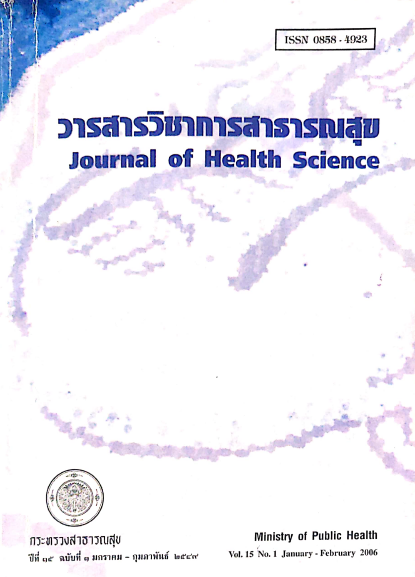Research Series of Thai Health Care Financing : Part 2 for National Health Security Fund - ชุดวิจัยการเงินการคลังระบบสุขภาพไทย : ตอนที่ ๒ ความเป็นไปได้ของแหล่งการเงินต่าง ๆ ของกองทุนหลักประกันสุขภาพแห่งชาติ
บทคัดย่อ
บทคัดย่อ
แหล่งการเงินหลักของหลักประกันสุขภาพถ้วนหน้าในปัจจุบันเป็นงบประมาณรายจ่ายประจำปีของรัฐบาล พระราชบัญญัติหลักประกันสุขภาพแห่งชาติ พ.ศ. ๒๕๔๕ มาตรา ๓๙ กำหนดให้กองทุนหลักประกันสุขภาพแห่งชาติมี ๘ แหล่งเงิน การศึกษานี้มีวัตถุประสงค์เพื่อวิเคราะห์ข้อดีและข้อจำกัดของเงินกองทุน จาก ๘ แหล่ง ในมาตรา ๓๙ แห่ง พ.ร.บ.หลักประกันสุขภาพแห่งชาติ พ.ศ. ๒๕๔๕ โดยการระดมสมอง นักวิจัยในสำนักงานพัฒนานโยบายสุขภาพระหว่างประเทศ และการสำรวจผู้สันทัดกรณีด้วยแบบสอบถามที่สร้างขึ้น โดยการประชุมเชิงปฏิบัติการกับผู้สันทัดกรณี ดำเนินการศึกษาในระหว่างเดือนมกราคม ถึงมีนาคม พ.ศ. ๒๕๔๗
การระดมสมองของนักวิจัยพบว่า มาตรา ๓๙ (๒) เงินจากองค์กรปกครองท้องถิ่น (๓) เงินที่เก็บจาก ผู้ใช้บริการ และ (๘) การเก็บเงินสมทบ มีศักยภาพในการเป็นแหล่งการเงินของกองทุนฯ ได้ แต่มีข้อจำกัด ทำให้ยังไม่สามารถเป็นแหล่งเงินหลักระยะยาวของกองทุนฯ ได้ การสำรวจความคิดเห็นผู้สันทัดกรณีจำนวน ๒๐ รายพบว่า ความเป็นไปได้ทางการเมืองเป็นปัจจัยสำคัญที่สุดต่อการตัดสินใจเลือกแหล่งเงินของกองทุน ปัจจัยรอง ได้แก่ ความยั่งยืนของแหล่งการคลัง ความเป็นธรรมในสังคม ความเป็นไปได้ในทางปฏิบัติ ส่วน การยอมรับของสังคมเป็นประเด็นที่ได้รับความสำคัญน้อยที่สุด เมื่อใช้ค่าคะแนนความเป็นไปได้ (๑ ถึง ๕) ของแหล่งเงินต่าง ๆ และถ่วงน้ำหนักด้วยค่าความสำคัญของแต่ละประเด็น พบว่า การเพิ่มภาษีบุหรี่ สุรา และเบียร์ เป็นแหล่งที่มีความเป็นไปได้มากที่สุด เนื่องจากมีความเป็นไปได้ทางการเมืองสูง ได้รับการยอมรับทางสังคมสูง มีความยั่งยืนในการเป็นแหล่งเงินระยะยาว และสามารถดำเนินการได้ง่าย ในทางกลับกัน การเก็บเงินสมทบจากผู้มีสิทธิ์มีความเป็นไปได้น้อยที่สุด เนื่องจากการยอมรับของสังคมน้อย ความยุ่งยากในการดำเนินการจัดเก็บเงินสมทบ นอกจากนี้ยังพบว่าการเก็บภาษีมูลค่าเพิ่มมีความเป็นไปได้น้อยที่สุดในทางการเมือง และเป็นทางเลือกที่ไม่ดีที่สุดในด้านความเป็นธรรม
แบบสอบถามที่ใช้ได้รับการพัฒนาขึ้นใหม่จากพื้นฐานความรู้ความเข้าใจการเงินการคลังระบบสุขภาพไทย กระบวนการตอบแบบสอบถามเลือกใช้การประชุมเชิงปฏิบัติการที่ให้ข้อมูลแก่ผู้ตอบแบบสอบถามอย่างรอบด้านและมีปฏิสัมพันธ์กับนักวิจัย เพราะต้องทำความเข้าใจให้ตรงกัน จึงเป็นข้อจำกัดที่ทำให้ได้ตัวอย่างจำนวนจำกัด แต่เป็นนักวิชาการจากหลากหลายสถาบันทั้งองค์กรวิชาการและภาคปฏิบัติ ผลการศึกษาใน ครั้งนี้ให้ความรู้เชิงประจักษ์ในทางเลือกแหล่งการเงินของกองทุนฯ ซึ่งเป็นความรู้ใหม่เกี่ยวกับแหล่งการเงิน ในระบบสุขภาพไทย และยังเป็นข้อมูลเบื้องต้นสำหรับการศึกษาแหล่งการคลังของกองทุนฯ ในระยะยาวต่อไปด้วย
คำสำคัญ: แหล่งการเงิน, กองทุน, หลักประกันสุขภาพแห่งชาติ, ภาษีเฉพาะเพื่อหลักประกันสุขภาพแห่งชาติ
Abstract
At present, the Universal Health Care Coverage in Thailand is fully financed by government general budget. According to National Health Security Act B.E.2545, Article 39. the National Health Security Fund can be generated from 8 sources of finance. This study was conducted during January - March 2004 and its aim was to analyze the advantage and limitation of eight sources of finance for UC according to Article 39 of the National Health Security Act B.E.2545. This study appied two methods, the brainstorming of research team and self administered questionnaire survey of 20 key informants in a one-day workshop. The result from brainstorming of researchers indicated that contributions by local government budget, co-payment by patients and contributions by beneficiaries had potential to be financial sources for UC with some limitation of each source
The result from the workshop of 20 key informants revealed that political feasibility was the most important domain to decide on sources of finance. Other subsequent important domains were sustainability, equity, programmatic feasibility, and social acceptance was the least important. Based on weighted score, the key informants had preference on additional excise taxes from tobacco, alcohol and beer which earmarked to the Fund, this was because it got high scores on political feasibility, social acceptance, sustainability and programmatic feasibility. On the other hand, contributions by beneficiaries were the least feasible source and it appeared to be socially unacceptable and administrative infeasible. Increases in the value added tax were deemed politically infeasible and was the worst in term of inequity.
Questionnaires used in the workshop were constructed by researchers, based on thorous understanding of financing Thai health system. All key informants were fully informed in the workshop in order to have the same understanding. This lead to limited numbers of key informants. However, these key informants were health experts coming from sever experts coming from several institutions both academic and program implementing agencies. This study contributed new knowledge of health care financing in Thailand. Moreover, it provided a fundamental information for the analysis financing of the UC scheme.
Key words: financing sources, UC Fund, National Health Security Act, earmarked excise tax for health





